Alcohol labeling bill creates divide
| Published: 02-08-2024 1:59 PM |
Aaron Share’s dog Blue has graced the cans – and premises – of To Share Brewing Company in Manchester for years.
The black and white pit bull is the mascot of one of the brewery’s longest running labels: “Hugs and Belly Rubs.” Cans for the oatmeal stout show a cartoon Blue sitting straight, hands rubbing her belly and head, smiling.
The real Blue lives a quiet life, wandering the brewery that Share founded five years ago and greeting stray customers with a toy. But the cartoon Blue caused a political stir last year, when officials at the state Liquor Commission briefly rejected Hugs and Belly Rubs and other To Share beer labels, arguing the stylized marketing was too enticing for kids.
The commission later backed off that decision after press coverage. But the controversy has ballooned into a standoff among breweries, state regulators, and substance use prevention advocates. And it has found its way to the State House, where the Senate is expected to vote down a bill that would explicitly bar alcohol labels with cartoon drawings from approval in New Hampshire.
Next week, the Senate is likely to send that bill, Senate Bill 335, to interim study, preventing it from advancing. Share is pleased.
“I feel like the bill unfairly targets smaller breweries that have artwork on their labels and are trying to do the right thing,” he said.
The bill’s fate is little surprise: It faced early opposition from breweries and prominent lawmakers, like House Majority Leader Jason Osborne. But organizations advocating against substance misuse say the risk to children posed by some alcohol marketing is real, and should be better regulated.
“Can’t we agree that an adult product should be packaged in an adult way?” said Dana Mitchell, coordinator for Dover Youth 2 Youth, a substance abuse prevention organization run by the Dover Police Department. “Make it interesting. Make it stand out. But watch out for – be careful of crossing that line.”
Article continues after...
Yesterday's Most Read Articles
 Twelve acres near Concord Walmart cleared for future retail development
Twelve acres near Concord Walmart cleared for future retail development
 When N.H. lawmakers refuse to vote with their party, it comes with political consequences
When N.H. lawmakers refuse to vote with their party, it comes with political consequences
 ‘Financially vulnerable’: Years of missteps led up to Merrimack Valley overspending by $2 million last year
‘Financially vulnerable’: Years of missteps led up to Merrimack Valley overspending by $2 million last year
 ‘New Hampshire is just going to embarrass itself’: Former Child Advocate warns against proposed office cuts
‘New Hampshire is just going to embarrass itself’: Former Child Advocate warns against proposed office cuts
 Skeletal remains near I-393 identified as Concord man, 36
Skeletal remains near I-393 identified as Concord man, 36
 25-year-old Concord man identified as Steeplegate Mall RV fire victim
25-year-old Concord man identified as Steeplegate Mall RV fire victim
To New Hampshire breweries, the can labels are expressions of art, not entrapments for kids.
Share has created more than 80 beer types since founding To Share, some as limited editions and others in the permanent rotation. The names are often personal: “Gold Civic” is an homage to Share’s 1985 Honda; “Bernard” a reference to his grandfather; and “Yoshimi” a nod to a favorite album by the Flaming Lips.
One West Coast IPA, Smokey’s Kangaroo, is particularly intimate. Smokey, Share’s former cat in college, had a stuffed kangaroo – “his toy, pet, whatever,” Share said – that he would carry around the house. The label features a black cat in a bedroom silhouetted by the moon and a kangaroo in the foreground leaning against a wall.
To decorate the labels, Share turns to a roster of five local artists, each paid about $250 per label design. Some of the labels are playful and cartoonish; others are more abstract.
“People love a beer, but they also like what’s outside of the can. It helps to distinguish yourself from a very competitive marketplace, especially if you’re getting your beer on store shelves.”
But the beer design process goes beyond the artwork. Typically, when breweries want to create a new beer label, they must apply to the commission with information on the name of the beer, its price, its alcoholic percentage, and its logo, among other data points. Speed is important, Share says: The brewery is attempting to package and label the new beer and get it to market before it spoils – ideally within six weeks of it being made.
Share knows the system. When the commission rejected four of his labels in November, they were the first “no” decisions he’d received in five years. That follows state statute governing liquor advertising restrictions in RSA 179:31.
In its letter to Share, the commission’s enforcers said the labels included cartoon or fictional characters that are “reasonably likely to induce a minor to drink,” he said. But the letter did not include suggestions on what the brewery could do to fix it, Share says.
Share prepared to appeal the decision to the full commission. But he also took his grievances to the media and contacted major politicians, including Manchester Rep. Matt Wilhelm, the House Democratic Leader, and the office Gov. Chris Sununu. After public attention, the commission changed its decision in days.
After his experience, Share says the legislation would just perpetuate unnecessary intrusion.
“The craft beer industry is supposed to be fun,” he said. “I mean, if you ever look at labels, craft beer cans are usually fun and artsy. And I have an issue with the government trying to regulate what is and what is not art because, you know, where does that end?”
The kids at Dover’s “Youth 2 Youth” see the issue differently, Mitchell says. The alarm bells first came with Mountain Dew. The soft drink brand had paired with the Boston Beer Company to make “Hard Mountain Dew,” a malt beverage flavored like the soda and containing 5 percent alcohol by volume.
The product is not sold in New Hampshire, but when they learned of it, members of the substance use awareness group were concerned. In 2021, they wrote a letter to the Liquor Commission laying out their worries that the new product would be attractive to kids and urging the commission not to approve it.
Then, they began looking for similar products in New Hampshire. It didn’t take long for the kids to assemble a short list. The findings included the Sunny-D vodka seltzer and the “Slushie” cans from Downeast Cider House.
The kids in Youth 2 Youth would peruse the beer section of grocery stores and other shops, identify beer labels that they felt were enticing to young people, and tell Mitchell. Mitchell would buy the beer, empty one of the cans with a hole in the back, and then give it to the kids to affix to a poster board with zip ties. After a year, Youth 2 Youth had assembled a number of examples, and they went to the Liquor Commission with their findings.
One of those labels was “Finding NEIPA,” a product of Concord Craft Brewing Company that featured a New England IPA with imagery reminiscent of the Pixar movie “Finding Nemo.” After the Liquor Commission revisited its approval, the label was discontinued by the brewery.
Youth 2 Youth has helped lead the charge against the beer labels. They’ve presented to schools, organized press events, interacted with Liquor Commission officials, and advocated about the issue to their local senator: David Watters, a Dover Democrat. Watters introduced SB 335.
To Mitchell, the bill would help create clear standards for the Liquor Commission to follow when making its decisions about the appropriateness of the labels. That clarity, he argues, would benefit kids, the commission, and even the breweries themselves, who would no longer face uncertainty over what would be approved when deciding whether to invest in a new label design.
“Maybe there’s drawings that are OK, but exaggerated cartoon animals that aren’t,” he said. “We need some guidance like that.”
SB 335 is on its way to failure: this week the Senate Commerce Committee voted 5-0 to recommend that it be sent to interim study and not advance. The full Senate will vote on that recommendation next week.
Kate Frey, vice president of advocacy at New Futures, which advocates for substance abuse prevention, argues the likely fall of the bill is a missed opportunity for cooperation between breweries and advocates.
Currently, the Liquor Commission doesn’t have clear directives for how to interpret the advertising statute, and enforcement decisions are largely subjective, Frey said. Adding a bare minimum of prohibited imagery, or a “floor,” would reduce that subjectivity and reduce tentative scenarios like Share’s, where his labels were rejected and then approved, Frey argued.
To Frey, prevention advocates’ concerns lie more with the national corporations trading on kid-friendly brands, like the alcoholic versions of Mountain Dew and Sunny-D – and the companies promoting the toy-like cocktail products BuzzBallz – than the local breweries.
And more collaboration from those breweries and the kids who are advocating could result in an enforcement regime that all could live with, she said.
“I really wish the industry could come together and come up with a solution and that groups like Dover Youth 2 Youth and other young people would be at that table, helping make those decisions,” she said.
For his part, Share is looking past his Liquor Commission entanglements. On Wednesday, he was manning the brewery alone, working on a new batch of a recurring beer: a doppelbock called Goats, Goats, Goats! The label has already been designed. In the drawing, about 40 cartoon goats, sporting 40 different emotions, are crammed into frame.
The design is so popular that a number of Share’s friends have been getting tattoos of individual goats, with the blessing of the can’s artist.
Share can prove it. He has one on his left arm.

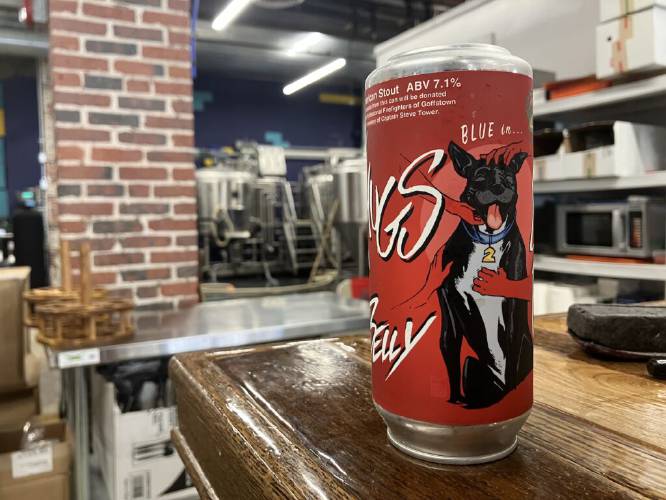
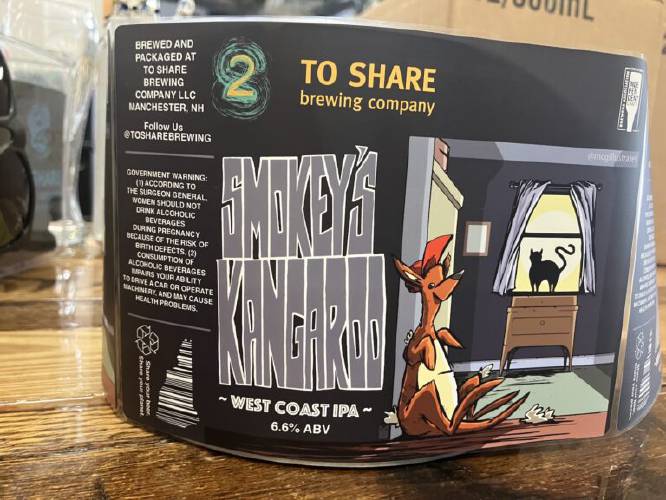
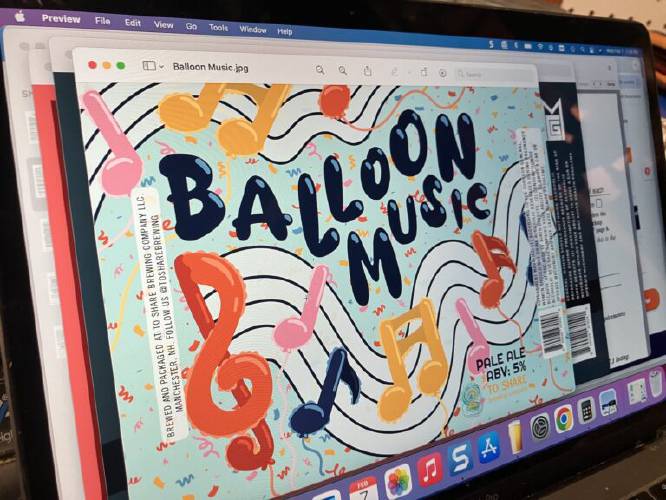






 ‘A wild accusation’: House votes to nix Child Advocate after Rep. suggests legislative interference
‘A wild accusation’: House votes to nix Child Advocate after Rep. suggests legislative interference 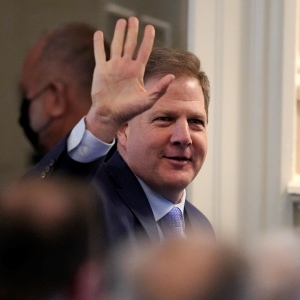 Sununu decides he won’t run for Senate despite praise from Trump
Sununu decides he won’t run for Senate despite praise from Trump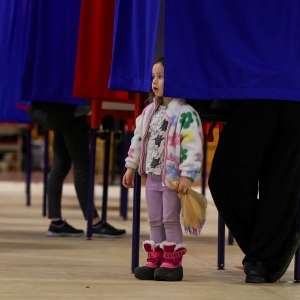 Town elections offer preview of citizenship voting rules being considered nationwide
Town elections offer preview of citizenship voting rules being considered nationwide Medical aid in dying, education funding, transgender issues: What to look for in the State House this week
Medical aid in dying, education funding, transgender issues: What to look for in the State House this week
